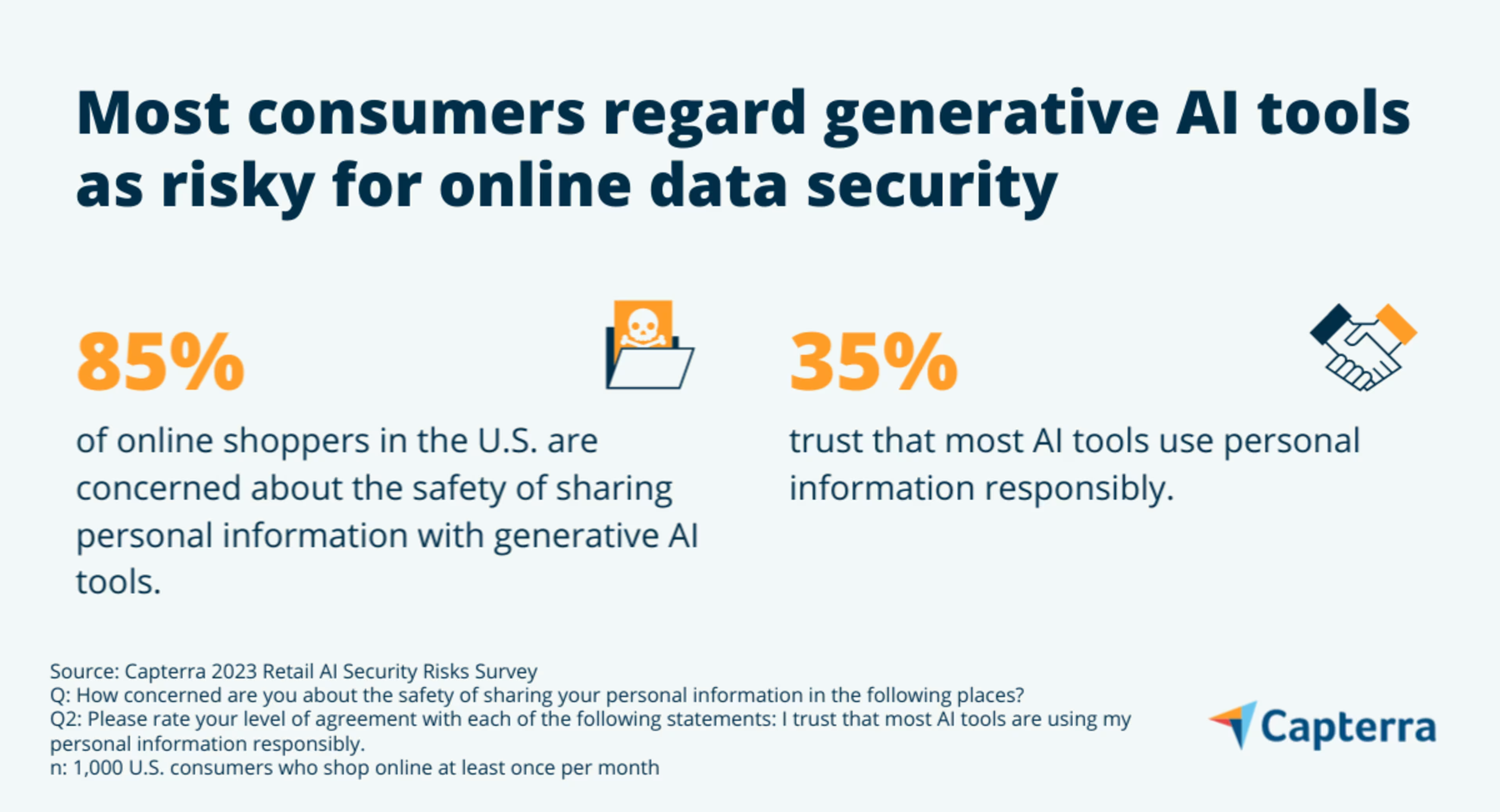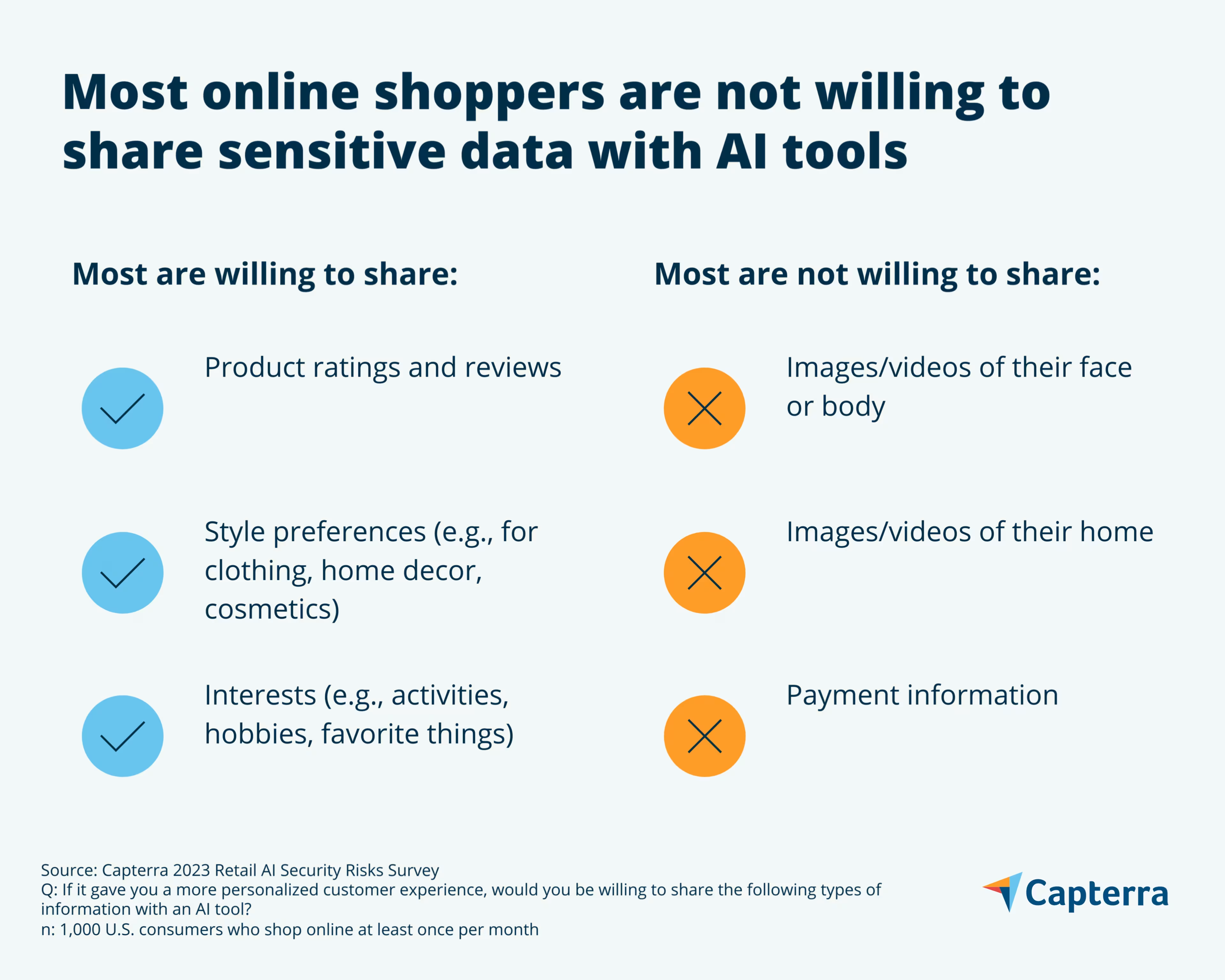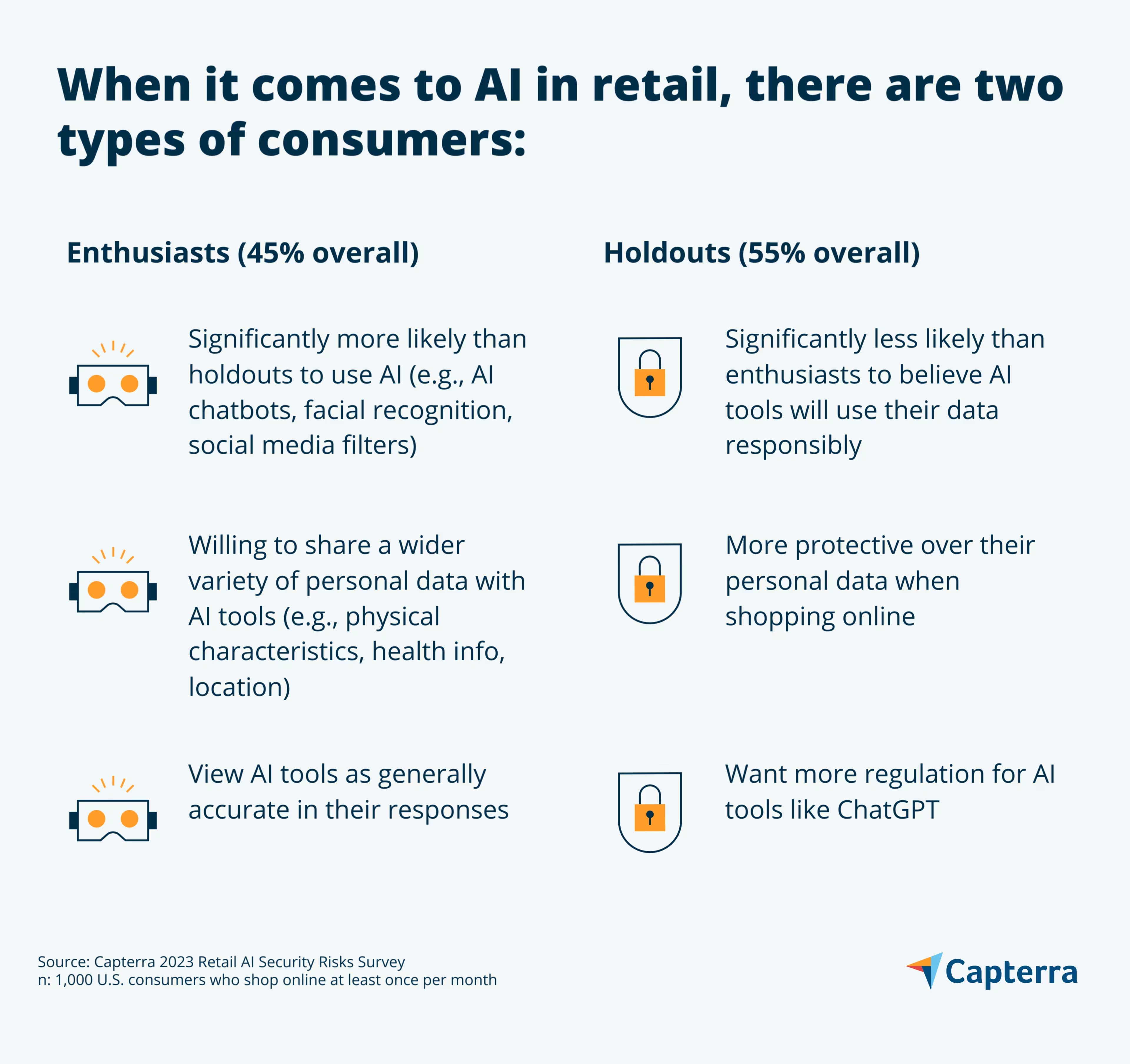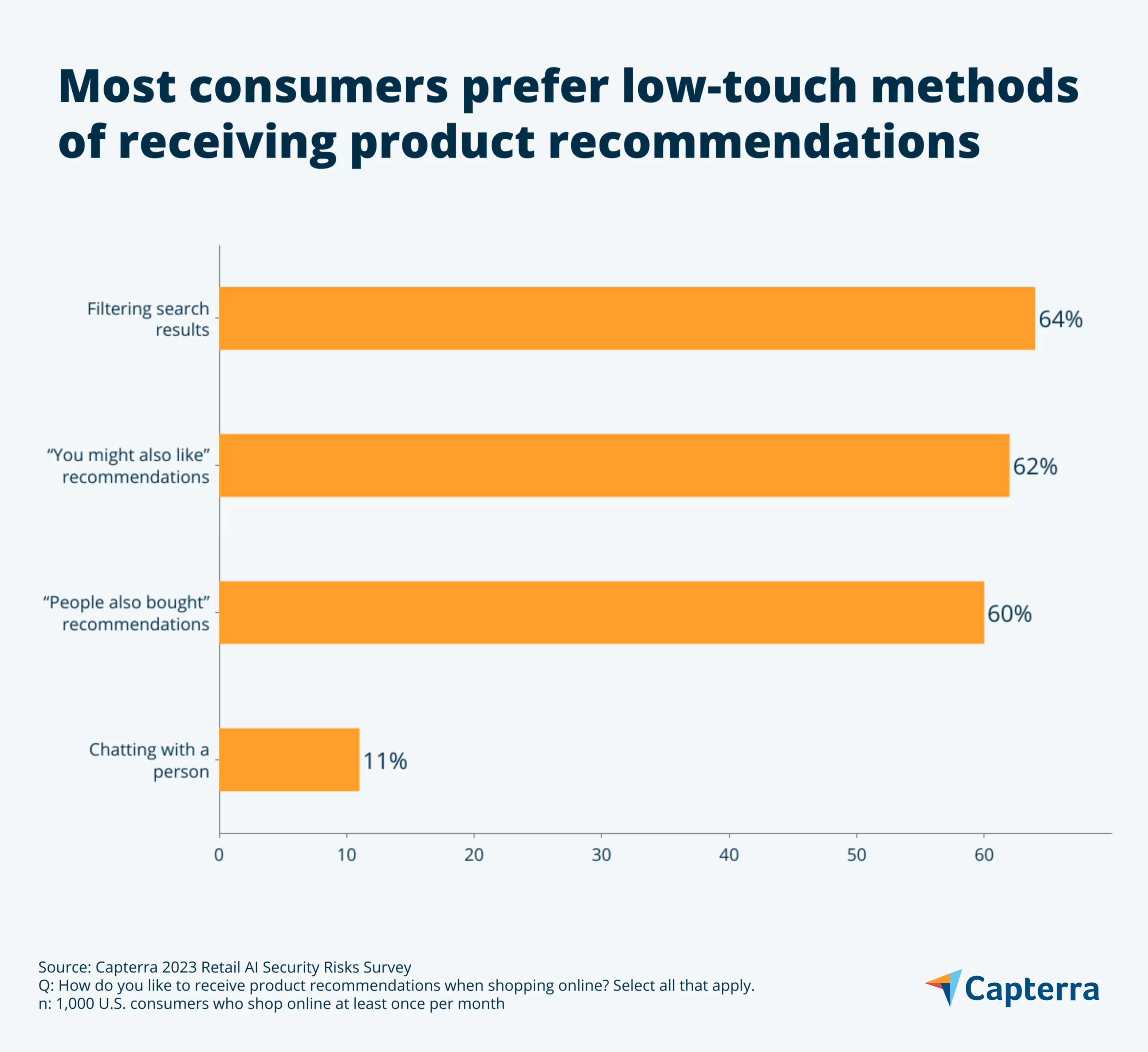Consumers worry their data isn't safe as retailers explore generative AI.
Following the meteoric rise of ChatGPT, consumers are cautiously entering a new era of personalized online shopping driven by artificial intelligence (AI)–with serious data privacy concerns in tow.
According to a recent Capterra survey, most online shoppers in the U.S. are interested in using AI tools for eCommerce.* However, fewer than half overall are willing to exchange personal data in return for personalized shopping experiences. They increasingly doubt whether it's safe to share data with AI: 64% are now more concerned about AI data privacy practices than they were last year.
AI is poised to transform how people shop online, as well as how businesses collect and interpret consumer data. If you run a small to midsize retail business, you should act quickly to avoid falling behind the retail AI surge. However, you'll need to carefully address consumers' valid concerns over how AI tools will handle sensitive data, or risk losing your audience.
/ Key findings
58% of consumers are at least moderately interested in shopping online using an AI tool
45% of online shoppers are willing to share personal information with AI tools in exchange for a more personalized eCommerce experience
Compared to last year, 64% of online shoppers are more concerned about the data privacy practices of AI tools
Just 35% of online shoppers believe AI tools will use their personal data responsibly
86% of online shoppers believe AI tools should face stricter regulation
AI-driven shopping tools promise greater personalization in eCommerce
Last year, ChatGPT—OpenAI's generative AI chatbot—exploded to the forefront of pop culture. It has since infiltrated Big Tech boardrooms[1], spurred competition in the generative AI space[2], and influenced national labor disputes.[3] ECommerce is among the first industries generative AI providers are aiming to disrupt.
Large retail companies have already hopped on board the generative AI train–see Klarna’s ChatGPT search plug-in, Zalando's AI personal stylist, and Mercari's AI shopping assistant chatbot.[4]
The goal is to bring to eCommerce the level of care and intuition offered by human store associates, replacing the hassle of DIY product research and scrolling endless not-quite-right options with instant, personalized recommendations so shoppers can quickly find the products they want (and discover products and brands an algorithm infers they might like). All shoppers have to do is share some personal information with the AI, which retailers can use to better understand their audience, enhance their product offerings, and refine their marketing efforts.
At least, that's what investors in retail AI hope will happen—if consumers can stomach AI's data privacy hazards.
Consumers are intrigued by retail AI but wary of privacy risks
Capterra's new research suggests that AI is generally gaining acceptance among U.S. consumers. Most survey respondents are aware of how AI factors into their everyday lives, from social media algorithms to autoplayed content on Netflix and "people also bought" suggestions on Amazon. Over half have used generative AI tools such as ChatGPT, and over a fifth have used AI graphics tools such as Lensa and DALL-E.
The majority of online shoppers actively seek out product recommendations before every purchase. The fact that they eschew person-to-person interactions in favor of low-touch methods for product research—like filtering search results and clicking on suggested products—suggests they'd find the fast and powerful product research capabilities of AI chatbots and search apps useful.
Consumer outlook appears promising at first glance: 58% of online shoppers are at least moderately interested in shopping online using AI tools, predominantly for finding apparel, electronics, and home goods.
A closer look shows that most online shoppers regard generative AI tools as interesting but flawed, and seriously risky to their online data privacy.

Consumers' concern is concentrated in three areas:
Sharing personal information: Most online shoppers think it's as risky or riskier to share personal data with AI as it is to store payment information in digital wallets or share their medical history on patient portals.
Use of customer data: Nearly two-thirds of online shoppers doubt their data will be handled responsibly by AI tools and their providers. The vast majority do not want providers of an AI tools to sell their data
Inaccurate information from AI: Online shoppers are well aware of generative AI's tendency to pass off inaccurate information as truth–known as AI "hallucination".[5] Nearly everyone (85%) worries they'll be misled by an AI tool.
U.S. consumers are so concerned over AI's leaky data privacy and propensity to lie that 86% believe it should face stricter regulation. They're not alone: earlier this year, Italy temporarily banned ChatGPT, while Britain, the European Union, and China are considering their own rules for AI technology.[6]
/ CASE STUDY
Human-in-the-loop AI tackles the hallucination issue
More human oversight could help consumers trust AI tools: 60% of online shoppers say they're more likely to use an AI tool if a human was evaluating its output. While that would necessarily delay the results of a customer's query, the extra human touch (known as human-in-the-loop AI) could also add value.
Take Stitchfix's "expert-in-the-loop" model: human copywriters review and edit algorithmically-generated product descriptions, saving employees while ensuring customer-facing copy is factual, on brand, and helpful to customers.[7]
Crucially, most online shoppers won't readily share the kind of data that could make their eCommerce experiences truly personalized, such as images of themselves and details about their lifestyle (e.g., their occupation or health regimen). Such information could allow AI tools to ask more helpful follow-up queries, make creative inferences as to what customers might like, and offer helpful suggestions—in other words, deliver the kind of personalized assistance currently only available through human store associates and personal shoppers.

/ Key takeaway
Be transparent with customers about how your AI tool will handle data and protect it from issues such as accidental loss, misuse, breaches, and cyberattacks. But understand that many consumers have strong–and valid–concerns about their personal data, and will still refuse to share the valuable information you need to increase personalization.
Engaging with AI enthusiasts comes down to transparency
A little over half (55%) of U.S. online shoppers are staunch retail AI holdouts–they're flat-out unwilling to share any sensitive personal data with AI tools. Their protectiveness over their data makes them resistant to using retail AI tools to their fully personalized potential anytime soon.
But there's still plenty of opportunity for retailers to engage with AI enthusiasts—the 45% of online shoppers who have a greater appetite for AI—are generally more optimistic about AI’s data accountability, and more willing to share sensitive data in exchange for better eCommerce experiences.

Make no mistake: while enthusiasts are more willing than holdouts to give this new technology the benefit of the doubt, they still want their data to be protected. In fact, almost half (42%) of AI enthusiasts are willing to pay for a private version of an AI tool that promises not to collect, store, or monetize the data they share with it.
/ Key takwaway
Identify the customers who are interested in using your AI tool and tailor the experience to their preferences. That way, the engagement is more useful for both parties involved. Consider offering premium AI tools to paying subscribers—but make sure you don't overreach on personal data.
Retailers should support customers' preferred product research methods while investing in an AI-driven future
ECommerce has arrived at an exciting inflection point. With AI, online shopping experiences have the potential to become richer and more satisfying for customers, and businesses can reap a host of benefits, from automating customer service tasks to enhancing their first-party data collection strategy.
Experts suggest that generative AI could help small retailers compete against big brands by making it easier to identify a niche and build up content quickly.[8]
Becoming an early adopter of generative AI will help retailers adapt smoothly to an AI-driven future. That said, the biggest takeaway from our findings is that, for now, retailers have to keep investing in the old-school methods by which the majority of their customers will continue to discover their products: site search functionality and human-led customer service, whether in-store, over the phone, or through an online chat window.

Additionally, retailers should:
Select AI vendors with vetted tools and solid data privacy practices
Be transparent with customers about how your business will use and protect their data
Avoid asking for data that customers don't feel safe sharing with AI tools
Designate a knowledgeable person (or better yet, a team) to handle data hygiene for your company
Following these guidelines will make it easier for you to provide an exciting and truly helpful experience for your customers.
58% of U.S. online shoppers are interested in using retail AI tools—is your business prepared for AI-driven eCommerce?
To get started with generative AI, you can browse Capterra's list of top generative AI software, which includes tools for copywriting, video production, and conversational chatbots.
As you invest in AI, don't neglect your site search functionality—check out our list of top picks for site search software so customers can find the right products in the way that best suits their needs.
And if you're unsure about adopting AI alone, you don't have to—find experts who can help you discover AI solutions for your business with our list of top AI service providers.
